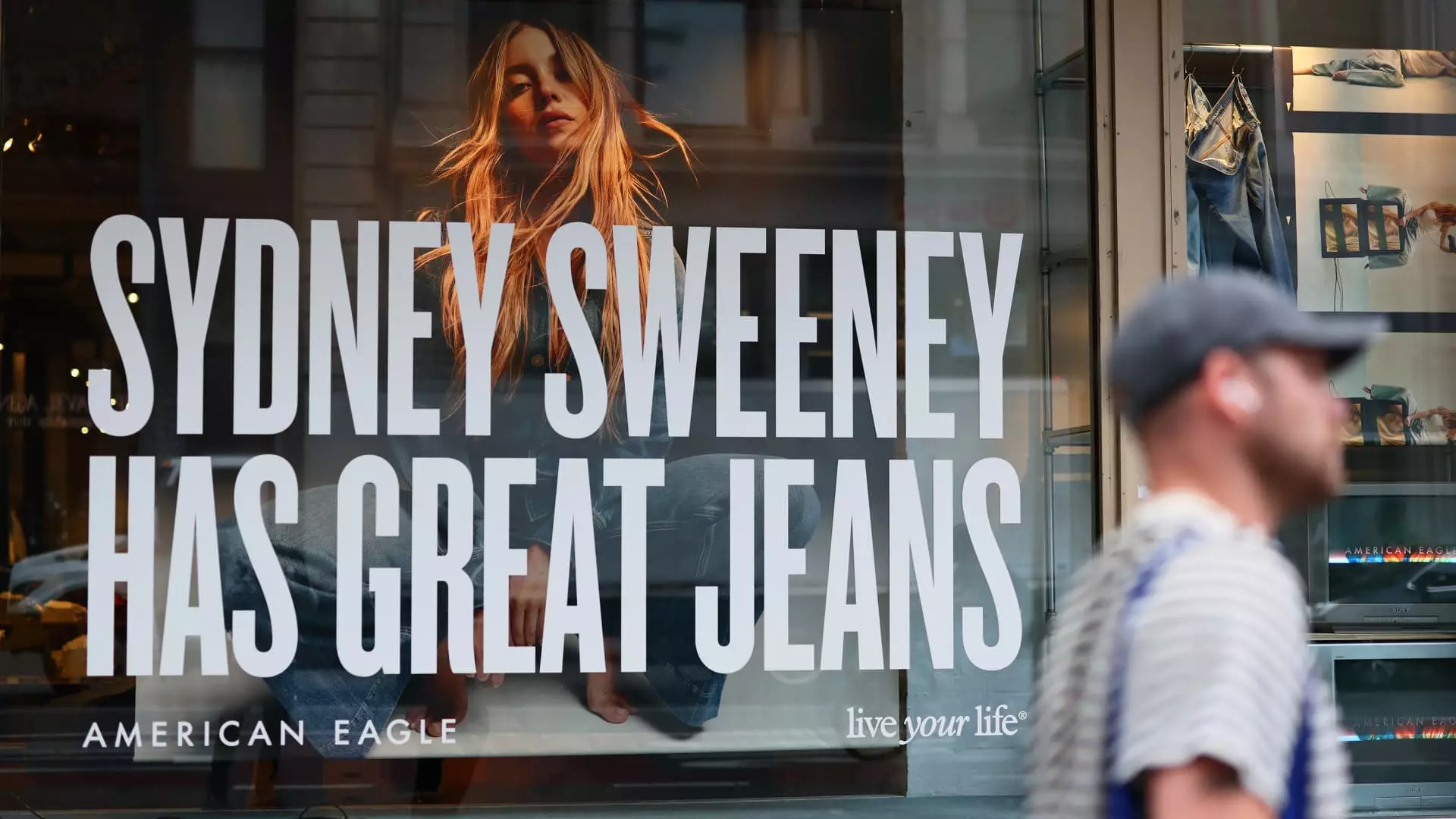In the fast-paced world of retail, standing out often hinges on bold, controversial, or provocative marketing campaigns. American Eagle’s recent efforts to leverage an endorsement from actress Sydney Sweeney exemplifies how companies are increasingly willing to walk the razor’s edge of cultural sensitivity to capture fleeting consumer attention. The controversy surrounding the slogan “Sydney Sweeney has great jeans,” which critics claimed hinted at her genetics rather than clothing, underscores how easily marketing messages can be misinterpreted or weaponized in today’s hyper-political climate. While some see this as a desperate attempt to appear edgy and relevant, it reveals a fundamental truth: in an era of social media, any message, no matter how innocuous intended, can become a battleground for cultural wars.
What makes this incident more revealing is the subsequent intervention of a political figure—former President Donald Trump—whose endorsement not only amplified the campaign but shifted the narrative entirely. Trump’s public endorsement turned a minor advertising controversy into a socio-political spectacle, demonstrating that political figures increasingly recognize the power of viral moments. When a brand’s message intersects with political discourse, it transforms from a simple commercial into an ideological battleground. This strategy—deliberately or unintentionally—can bolster brand visibility but also invites intense scrutiny from both allies and foes.
The Double-Edged Sword of Political Endorsement
Trump’s endorsement of American Eagle was a masterclass in leveraging celebrity, politics, and populist sentiment for commercial gain. His praise for the campaign, calling the ad “HOT” and claiming the jeans were “flying off the shelves,” provided an enormous boost to the retailer’s stock performance—surging over 15%. This move typifies a broader pattern where political figures inject themselves into consumer branding, often with the goal of appealing to a core demographic that aligns with their policies or ideology. In this instance, Trump’s recognition of Sweeney being a “registered Republican” bolstered American Eagle’s appeal among conservative consumers who might have hesitated with more “woke” marketing approaches.
However, the risks inherent in this strategy are significant. When a company’s campaign becomes intertwined with political endorsement, it can alienate portions of the audience that oppose the endorsing figure or the ideological stance they embody. American Eagle’s previous struggles with sales and brand resonance—marked by slow growth and a decline in peer ranking—suggest that they are desperately searching for a formula that works. Turning to a politically charged figure as a booster may temporarily increase buzz, but it also makes the brand more vulnerable to backlash if the political atmosphere shifts or if the endorsement is criticized as opportunistic or insincere.
Market Reaction and Cultural Climate
What’s particularly telling about American Eagle’s recent surge is not merely the immediate stock rally but the broader commentary it signals about market dynamics and cultural polarization. The late-2020s landscape is rife with examples of firms that either align too heavily with “woke” or progressive causes facing boycotts or dips in consumer confidence, such as Bud Light’s divisive Dylan Mulvaney partnership. American Eagle’s move away from that vein—embracing a more traditionally conservative marketing tone—illustrates how brands are recalibrating their messages to appeal to cultural conservatives who feel alienated by mainstream commercial woke messaging.
This shift is not without consequence. While the immediate market reaction was positive, the long-term implications hinge on whether such campaigns truly influence consumer behavior or merely generate fleeting attention spikes. Current data shows that search interest for American Eagle hit levels unseen in two decades—an indicator of effective top-of-mind awareness. Whether this translates into sustained sales remains to be seen, especially given the company’s broader struggles with macroeconomic headwinds like tariffs, inflation, and consumer spending jitters.
The broader political and cultural context suggests that corporations now tread a fine line: address a conservative demographic without outright alienating their progressive core. The American Eagle case demonstrates that if a campaign is perceived as aligning with a particular ideological stance or political figure, it can serve as both a rallying cry and a lightning rod—but the true challenge lies in turning these moments into durable retail success, not just viral sensations.
The Overarching Power Dynamics in Consumer Culture
In today’s consumer landscape, marketing campaigns are no longer just about product features—they’re about signals. The American Eagle episode proves how cultural symbols and political endorsements can dramatically amplify brand visibility. It’s a reminder that corporations operating within an increasingly polarized society must recognize their role as political actors, consciously or unconsciously. The decision to sidestep “woke” marketing strategies in favor of more traditional, conservative messaging appears to be a calculated risk for American Eagle, which, after recent sales declines, needs every advantage it can muster.
The influence of celebrity endorsement—particularly when tied to political figures—institutes a form of social validation that can override traditional marketing metrics. Yet, such endorsements also come with a price: susceptibility to the shifting tides of public opinion and political discourse. The real challenge for brands is balancing this power, ensuring that their messaging stays authentic while avoiding being pawned for political gains or backlash.
By courting controversy or endorsement from polarizing figures, companies risk transforming their marketing campaigns into cultural flashpoints. This strategy can yield rapid attention, but whether it sustains long-term brand equity depends on consumer perceptions and broader societal trends. The American Eagle episode is a potent modern illustration of how marketing is now an extension of political and cultural identity—and how corporations, whether willingly or not, are becoming active participants in ideological battles that go far beyond fashion or retail.


Leave a Reply